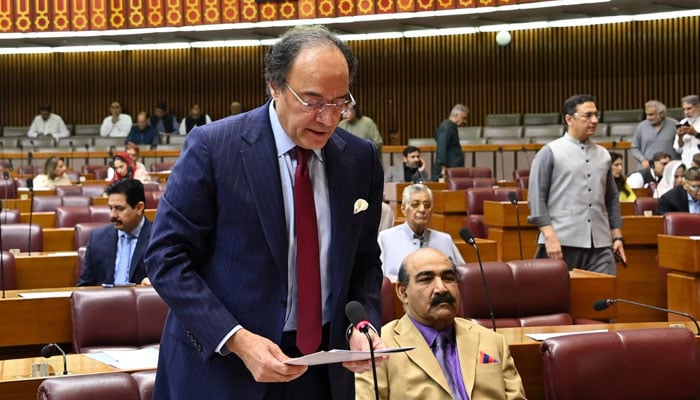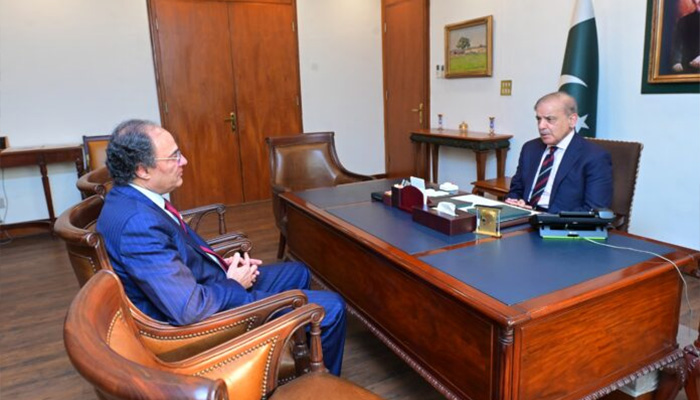NA passes tax-heavy budget as Pakistan looks to secure new IMF deal
Policymakers have set challenging tax revenue target of Rs13 trillion rupees for year starting July 1
ISLAMABAD: The National Assembly on Friday passed the tax-heavy Finance Bill 2024 as the government seeks to secure the new International Monetary Fund (IMF) bailout package by fulfilling its requirements.
The budget, for the fiscal year 2024-25 (FY25), with a total outlay of Rs18.877 trillion was unveiled by the federal government two weeks ago, eliciting harsh criticism from opposition parties.
Finance Minister Muhammad Aurangzeb moved the finance bill to the lower house of the parliament, which was endorsed by the ruling alliance, including the Pakistan Peoples Party (PPP).
The motion was passed with majority vote which led to the passage of Finance Bill-2024 after clause-by-clause reading and adopting amendments after due process of voting. All the amendments, presented by the opposition members, were rejected.
NA Speaker Sardar Ayaz Sadiq announced the passage of the bill in a live TV telecast.
Ambitious tax target
Policymakers have set a challenging tax revenue target of Rs13 trillion rupees for the year starting July 1, up about 40% from the current year, in the national budget presented on July 12 that looked to strengthen the case for a new rescue deal with the IMF.
Pakistan is in talks with the IMF for a loan of $6 billion to $8 billion. The rise in the tax target is made up of a 48% increase in direct taxes and a 35% hike in indirect taxes over revised estimates of the current year. Non-tax revenue, including petroleum levies, is seen increasing by a whopping 64%.
The tax would increase to 18% on textile and leather products as well as mobile phones besides a hike in the tax on capital gains from real estate. Workers will also get hit with more direct tax on income.
Pakistan has projected a sharp drop in its fiscal deficit for the new financial year to 5.9% of gross domestic product (GDP), from an upwardly revised estimate of 7.4% for the current year.
The upcoming year's growth target has been set at 3.6% with inflation projected at 12%. The government has decided to increase the levy on petrol and diesel from Rs60 per litre to Rs70 per litre, which the finance minister maintains would be increased gradually.
Rs50 per litre levy would also be imposed on light diesel oil and kerosene oil, while Rs70 per litre levy would be applicable on high-octane.
Increasing tax-to-GDP ratio
Responding to the points of the opposition on the Finance Bill, 2024, Minister Aurangzeb said the economy had achieved stability.
He expressed the government's determination to further enhance the stabilisation process to steer the economy towards growth.
Sharing the economic indicators, the finance minister pointed out that there is a reduction in the current account deficit and the fiscal deficit is also under control.
The minister said the currency has been stable over the last six to seven months, expressing the confidence that this stability will remain in the time ahead.
He said the foreign exchange reserves have reached $9 billion and that the inflation has come down to 11% from 38%.
Aurangzeb said enhancing the tax-to-GDP ratio and reforms in State Owned Enterprises and the energy sector are part of the budget for the next fiscal year.
The finance minister said the tax-to-GDP ratio would be increased to 13% in the next three years. He said the government's privatisation plan consists of two to three years and it will be executed.
Additional taxes on travel
Moreover, during the session, it was also announced that starting July 1, 2024 an additional tax of Rs100,000 will be imposed on business class and club class tickets to the United States and Canada.
For Europe, an extra tax of Rs60,000 will be levied on business class and club class tickets from the same date. Similarly, an additional tax of Rs60,000 will be applied to business and club class tickets to New Zealand and Australia.
Tickets to Dubai, Saudi Arabia, and other Middle Eastern and African countries will see an increase of Rs30,000 for business and club class travel.
'Inflation will increase'
Opposition parties, mainly parliamentarians backed by the PTI, have rejected the budget, saying it will be highly inflationary.
In his address, Leader of the Opposition in the National Assembly Omar Ayub said that his party rejects the "anti-industry and anti-people budget".
Calling the budget "economic terrorism" against the people, the PTI leader said the treasury benches are "the killers of the masses", who are unaware of the economic realities.
"Inflation will increase due to this budget. There will be no economic growth with this budget," the parliamentarian said, noting that electricity prices will increase from Rs70 to Rs85.
State Bank of Pakistan has also warned of possible inflationary effects from the budget, saying limited progress in structural reforms to broaden the tax base meant increased revenue must come from hiking taxes.
PTI Chairman Barrister Gohar Khan said there's no austerity plan in the budget and that during the incumbent government's tenure, a huge amount of people have become unemployed.
"KP is being targeted because its people have voted for Tehreek-e-Insaaf," the politician added.
Jamiat Ulema-e-Islam (JUI-F) lawmaker Aliya Kamran said that the budget has several "defects" and that imposing a duty on medical devices would make the life of the poor more difficult.
Referring to the proposals, she said if the budget is approved, it would increase the prices of milk and stationery. "Now, overseas Pakistanis will not be able to donate medical equipment either. Computers have also been taxed."
PM slams KP govt
During the session, Prime Minister Shehbaz Sharif questioned the Khyber Pakhtunkhwa government for its failure to establish the Counter Terrorism Department (CTD) despite receiving Rs590 billion during the last 14 years.
The prime minister, responding to a point of order raised by Sunni Ittehad Council member Asad Qaiser, highlighted that under the NFC, an additional 1% share was allocated for the KP province just to augment its efforts against terrorism.
He said the last NFC Award was agreed upon in 2010 by the government of Syed Yousuf Raza Gilani when terrorism was at its peak and the KP province suffered the most, followed by Balochistan and other provinces.
The prime minister said that KP people had been the frontline soldiers against terrorism which would always be remembered.
He said the additional one percent share for KP in NFC was still intact and no other province including Balochistan got such funds nor objected to it despite immense sacrifices by their law enforcement agencies and people against terrorism.
He told the House that from 2010 till now, the KP province had received Rs590 billion but could not yet establish the CTD for which the funds were mainly allocated.
"This also needs to be looked into as to why the CTD is still incomplete there despite getting such huge funds," he remarked.
Coming to another objection by the opposition member, the prime minister told the House that the federal government had forwarded a panel of three persons, as per tradition, asking the KP government to choose one officer for appointment as chief secretary which they have not decided so far.
He also offered to revise the panel if the provincial government desired so but rubbished the allegation of any discrimination against the province.
PM hails budget's swift approval
PM Shehbaz hailed the swift approval of the budget 2024-25 by the National Assembly, praising the tireless efforts of Finance Minister Aurangzeb and his team for preparing a pro-people budget that prioritises the welfare of the common man and promises to steer the country towards economic prosperity.
Talking to the finance minister in the National Assembly, the prime minister expressed his satisfaction with the active participation of all the treasury and opposition members in the budget session.
He also appreciated the efforts of the officers from ministries of finance, planning, other relevant ministries and the Federal Board of Revenue (FBR) in preparation of the budget, the state news agency APP reported.
The government, he said, tried its best to utilise all possible resources to provide maximum relief to the common man. The premier said the government provided relief to the salaried class, pensioners and workers.
The premier highlighted that special attention was given in the budget to various important sectors such as health, education, agriculture and information technology.
He said the elite class and the tax evaders would be brought into the net. "It is not possible that the poor pay the taxes and the elites enjoy tax exemptions," he added.
Expressing satisfaction over the economic situation, the prime minister said the country’s economy had now been put on the right path and that Pakistan’s journey of prosperity had begun.
He said due to the business-friendly policies, the trust of investors had been restored in the government. The government is taking steps to bring reforms in the departments and privatise the loss-making state-owned entities on priority, he added.
-
Bitcoin plummets toward $60,000 as investors dump risky bets
-
Bitcoin crashes below $63K as regulatory pressure and market fears grow
-
Bitwise Crypto Industry innovators ETF: What investors should do in 2026?
-
Nintendo shares slide again as momentum fears grow
-
Gold, silver prices fallen sharply; What’s driving the drop?
-
Gold’s record climb: Experts question if its safety is ‘overstated’
-
Dubai unveils plans to construct street built with real gold
-
Netflix slams Paramount’s bid: 'Doesn't pass sniff test’ as Warner battle escalates













